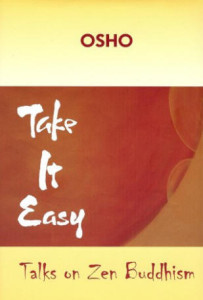Talks on Zen Buddhism
In these delightful and playful talks, Osho introduces the mystery, the wonder and the emptiness that is Zen. He shows how verses by the fourteenth Zen master, Ikkyu, can stir the heart, touch the being and help our transformation.
Osho and Ikkyu’s whole message is about how to experience the essence of emptiness: that blissful state of no-mind where all old conditionings are gone and man is free just to be himself. As Osho speaks of Ikkyu, and answers people’s questions, he is also speaking of himself. As he speaks of who Ikkyu is, he is revealing more about himself. Osho gives a fresh, new understanding of himself, and shows how each person can find the way to light his own path.
TAKE IT EASY NEDERLANDS
De titel van het boek ‘Take It Easy’ omvat een van de kern uitgangspunten van de levensstroming Zen.
Zen gelooft eenvoudigweg nergens in, want alles is een. Of het nou om het goddelijke gaat of om een hond, om Boeddha of om niet-Boeddha, de onwetende of de wijze, de zondaar of de heilige, het is allemaal een. Het lijkt zo simpel, zoals dit hier weergegeven wordt. Maar helemaal nergens in geloven, komt toch weinig voor in het leven.
Het lijkt zo simpel, zoals dit hier weergegeven wordt. Maar helemaal nergens in geloven, komt toch weinig voor in het leven.
Het wordt wel door mensen met veel aplomb beweerd, maar dan komt daarachter vaak het welbekende zinnetje: ik geloof alleen in mezelf.
Maar daarmee zit je totaal niet op het spoor van Zen.
Want op die manier wordt er al bij voorbaat een wig in het geheel gedreven: de afsplitsing is een feit.
Impressie van het boek ‘Take It Easy’
In de twee delen van Take It Easy heeft Osho commentaar op de Zenmeester Ikkyu. Zen is bijzonder in het gewone en dat geldt ook voor de zenmeesters.
Meestal is er niet veel over hen bekend, juist omdat ze zo gewoon zijn.Over Ikkyu bestaan een paar verhalen die de man uitzonderlijk in het natuurlijke
maken en daardoor echt van zen.
Op een nacht bevond hij zich buiten de tempel in een zeer koude winternacht. Midden in de nacht werd er vanuit de tempel geluid en fel licht waargenomen op de plek waar Ikkyu zich bevond. Wat was het geval: Ikkyu zat zich buiten te warmen bij een vuur dat hij gemaakt had door een houten boeddha-beeld in brand te steken.
De priester van de tempel was hier uitermate ontstemd over en beschouwde dit min of meer als een doodzonde. Maar Ikkyu geeft hier een uitermate verbluffende respons op, zoals in het boek te lezen is.
Maar Ikkyu geeft hier een uitermate verbluffende respons op, zoals in het boek te lezen is.
In zijn soetra’s is Ikkyu een waar dichter.
“Look at the cherry blossoms!
Their colour and scent fall with them,
Are gone for ever
Yet Mindless
The Spring comes again.”
Als commentaar hierbij geeft Osho het volgende: Het gaat om sammasati, zoals Boeddha het noemt, dat wil zeggen: right awareness.
Laat je niet om de tuin leiden door het comfortabele, gemakkelijke leven dat je leidt. Want de dood gaat dit allemaal overhoop gooien en vernietigen.
Bereid je erop voor! En de enige manier om dit te doen is door balans weten te houden.
Het boek Take It Easy is verkrijgbaar bij de Boekhandel of via internet.
Impression of Take it Easy
Transformation instead of Information
“The purpose of the buddhas is not to inform you but to transform you. They want to bring a radical change in your consciousness, they want to change your very roots. They want to bring new eyes to you, new clarity. Their purpose is not to inform. They are not there to transfer some knowledge but to transplant some being. They want to share their light with you – the purpose is not to inform but to enlighten.
“Hence they don’t bother what your question is. Their answers may sometimes look very irrelevant, absurd. They are not – but they have a totally different kind of relevancy. They are relevant to you, not to your question.
“Now, this monk asks Master Pai-Chang, ‘Who is the Buddha?’ And Pai-Chang answers, ‘Who are you?’
It is about Awakening
“See the point: he is turning the whole question into a totally new dimension. He is not answering, in fact he is giving a deeper question than the monk had asked – he is answering with another question. ‘Who is the Buddha?’ – the answer is easy, he could have said, ‘Gautam Siddhartha.’ But that is irrelevant; he is not interested in the history of thought, he is not interested in history at all. He is not concerned with a certain man called Gautam Buddha, he is more concerned with a certain awakening that can happen in everybody. That is real buddhahood.
“He turns the question towards the questioner himself. He makes a sword out of the question and pierces the very heart. He says: ‘Who are you?’ Don’t ask me about buddhas, just ask one question: ‘Who am I?’ and you will know who the buddha is – because everyone is carrying the potential of being a buddha; there is no need to look outside yourself.
Truth is your Being
“Lao Tzu says: To find truth, one need not go out of his room. One need not even open the door, one need not even open his eyes – because truth is your being. To know it is buddhahood.
“Remember it: the statements of Zen masters are not statements in the ordinary use of the word. They are not to convey something that you don’t know. They are to shock you, provoke you, into a new quality of consciousness.” Osho
